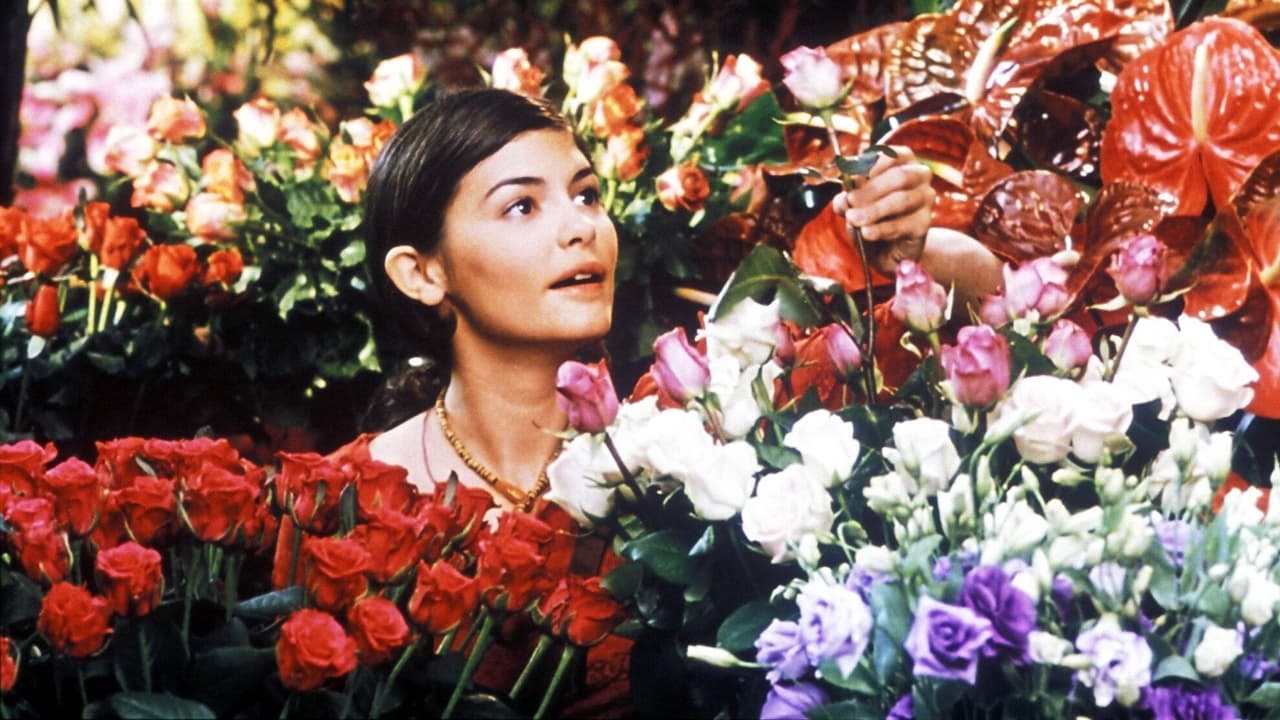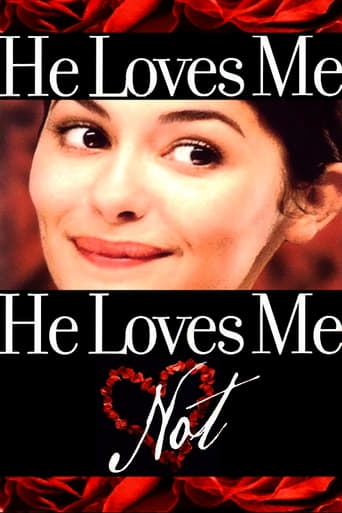

it was a short and enjoyable movie. in fact, it isn't similar to Amilie as it is said. you can guess the end of it but I couldn't take myself to be surprised. despite the obsession of Angelique, she was absolutely cute. differently, I have learned a new psychological term "erotomania"and now I am searching about. it is really threatening.
... View MoreAudrey Tatou portrays Angelique; a beautiful and talented art student who falls deeply in love with married cardiologist Loïc. Over the first half of this movie, they plan how he will escape from his unhappy marriage, his pregnant wife and live an idyllic existence together. Initially, the story focuses on Angelique's point of view; we see her conspiring with her treacherous paramour, leaving voice mail messages and sending love letters and as such, this appears to be no more than a conventional, if rather sordid tale of betrayal and marital infidelity. However, half way through the movie, our perspective changes, and now we see the story through the eyes of Angelique's object of desire; Loïc. Without giving away the ingenious premise, I will say that the story is not as straightforward as it first appears. Our preconceptions and expectations are challenged, and the personalities of the participants are laid bare. This is a sometimes uncomfortable examination of obsession and the lengths human beings will go to in the name of love.
... View MoreHe Loves me, He Loves Me Not The very title conjures up images of lovelorn girls bemoaning their romantic tribulations, falling in and out of love and pursuing the un-pursuable. At first it seems like the director makes the typical plot work, with a vibrant visual eye and knack for keeping the relationship at a fast but believable pace. For a time it's ridiculously but bearably sugary, even the opening credits are laid over images of love heart merchandise, with a delightful bells and whistles score chiming out for new romance in the background. As expected he state of the relationship gets progressively worse, the tone then fades slowly into a darker one, becoming like increasingly like a tragic melodrama. Angelique, the central character, goes overboard and overreacts to the downward slide As happens due to love, so we sympathise. Then everything changes, a monumental twist occurs and the film changes into a different one. The audacity in such a move isn't because it's especially deceptive or unjustifiable (ala The Usual Suspects), but because it so fluidly and intelligently reinvents everything we've already seen But yet still ties in with all we've witnessed, making complete sense because of how it is implemented within the boundaries of the film. The sweetness tastes bitter, pleasant events become darkly comedic and the emotional tragedies of the first half have to be urgently reconsidered.Audrey Tautou, as well as playing the Amelie charm and feminine charisma wonderfully, adds a new level of oddity and disturbance rarely seen in roles played by young women. In tune with the films development her characters real nature comes out gradually, but because she plays up the quintessential lightness it's almost hard to believe when more is revealed about her. I found myself asking "How could Audrey Tautou do that???", which was obviously the reaction the director and Tautou herself wanted to project With her image adorned to the character, the eventual narrative twists and re-assessments that follow are made all the more hard to swallow but even more interesting to consider. An inspired piece of casting and one of many brilliant uses of subversion the film employs. The cinematography carries the same structural and performance development, with the first section making use of slow-motion, colour and intentionally formal methods, in many ways lulling the viewer and taking advantage of the expectation that what we see is the one and only truth. The second half appears more shadowy, with an emphasis on hand-held movements. More scenes are inside with a greater feeling of paranoia and worry, with very little bright light or colour. The background appears to be out of focus more often than not, whether this is the case or I just was more aware of it, looking out for another threat, after the sudden burst of unpredictability the twist unleashes.Even with the elements of romance and suspense, the director manages to squeeze a perfect amount of dark humour out of genuinely macabre situations. Not a single joke is told, but through manipulation of musical and narrative cues and clues, there are some hilariously dark and bizarre comedy elements at play Not the kind of humour I personally would expect from the romance genre, least of all French romantic cinema. Equally intelligently worked in are some of the more grim strands, looking at the film as a whole some of the revelations are quite shocking, but the subtle humour and tragedy are both secondary to the expertly weaved story structure and character expositions. He Loves Me, He Loves Me Not is riveting because of the director's ability to celebrate, indulge in, and subvert convention. In a "Why didn't I notice that?" fashion the director toys with the fundamentals of perception, in the internal sense of character focus and reaction, and the external case of playing with the viewer's engrained expectations of structure and narrative. The plot does slightly peter out towards the end, as all of the pieces of the puzzle have to naturally fall into place, but we're left looking at a pleasantly surprising, challenging work of great excitement. One for those who like a little bit of everything in their cinema.
... View MoreHe Loves Me, He Loves Me Not (2002) - which is a not entirely accurate interpretation of the original French title "À la folie... pas du tout", but regardless, is one that does an adequate job of developing the film's narrative preoccupations and central game within the structure - is an enjoyable film that works, despite the limitations of its obvious gimmick. Clearly, this isn't the first time that a filmmaker has played with the idea of a shifting narrative perspective - with one of the earliest examples being Akira Kurosawa's historical masterpiece Rashomon (1950) - but regardless of a sense of "been there, done that", the film remains fresh enough to succeed and reward the audience, even with the benefit of repeated viewings. Much of the success of the film is down to the mood that is established in the first half of the film, the subtlety of the performances and the ironic appearance of Audrey Tautou, then fresh from the success of Jean-Pierre Jeunet's frothy modern-day fantasy Amélie (2001).Unsurprisingly, director Laetitia Colombani seems desperate to tap into the style and iconography of Jeunet's film, with the full-colour wonder of Bordeaux seeming like a candy-striped fantasia here; with the lush pastels, giddy camera movements and a larger than life approach to the character and the psychological world that they seemingly inhabit. This is directing at its absolute richest, with the lack of any kind of obvious delicacy and the particular use of design and mise-en-scene creating just the right mood of fantastical abstraction for the eventual shift in tone to take effect.Tautou's performance as the seemingly bright and breezy Angélique - her name, yet another delicious pun on her very angle-like appearance in the context of Amélie - is much more intelligent and demanding than the earlier scenes of the film might suggest; with Tautou having to walk a delicate line between beguiling innocence and adorable charm, with the much more dangerous and obsessive qualities that ultimately make her character detestable and entirely unsympathetic. The switch in tone is seen inverted somewhat by the performance of Samuel Le Bihan as the object of her affections; beginning the film as a cold and immediately dislikeable character and ending it as a sympathetic hero. His performance is perhaps even more subtle than Tautou's, with the success of the film relying heavily on his ability to occupy two completely different stands of narrative simultaneously, while at the same time, still leaving us guessing as to the intentions of his character.As a result, the film manages to succeed on a number of levels; as a light-hearted rom-com, a dark psychological study, and a twisted thriller all jostling for our attention simultaneously. As the perspective switches back and forth the real games within the narrative become clear and the allusions to the title begin to make sense. I wouldn't go so far as to call it a masterpiece, as there are some obvious minor flaws... chiefly, the later portrayal of Angélique as she eventually becomes the most hateful of characters. The final scene also leaves something of a bitter aftertaste, though it is clever and definitely works within the context of the rest of the film's dark, ironic humour.Regardless of these slight issues, He Loves Me, He Loves Me Not is a rich and imaginative film that presents a story that could have quite easily become a hopeless cliché as something that is instead much more fun and delightfully eccentric. The central performances from Tautou and Le Bihan anchor both sides of the story, while there is fine support from Isabelle Carré, Clément Sibony and Sophie Guillemin, who each have to act and react in different ways to the ever shifting narrative. You can see it as a novelty if you like. Certainly, as I stated above, the central experiment with the narrative is something of a gimmick, but I feel that the film as a complete piece of work more than overcomes any such minor shortcomings. Take it for what it is and the film will reward... i.e. an enjoyable and sometimes shocking work, designed to entertain and engage on some vaguely thought-provoking level.
... View More